Benefits of Breathing Hydrogen
Introduction
Breathing hydrogen gas (H2) has emerged as a novel therapy
with a range of potential health benefits. Hydrogen,
the smallest and most abundant molecule in the universe,
is being studied for its therapeutic effects on various
diseases and conditions due to its powerful antioxidant
and anti-inflammatory properties. Here are some key benefits
of hydrogen inhalation therapy based on current research:
In recent years, hydrogen inhalation therapy has garnered
significant attention for its potential therapeutic benefits.
Research indicates that hydrogen, a simple molecule,
can have profound effects on oxidative stress and inflammation,
which are underlying factors in many chronic diseases.
This newsletter delves into the scientific findings and
potential health benefits of hydrogen inhalation therapy.
The Science Behind Hydrogen Inhalation
Hydrogen gas (H2) has been found to have antioxidant
properties, neutralizing harmful free radicals in the
body. Studies, such as those published by the National
Center for Biotechnology Information (NCBI), have shown
that hydrogen can selectively reduce cytotoxic oxygen
radicals, thereby protecting cells and tissues from oxidative
damage?
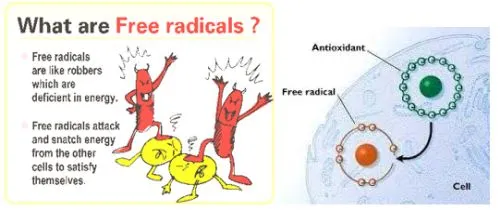
In a notable study, researchers administered hydrogen-rich
water and hydrogen gas to mice and observed changes in
gene expression related to oxidative stress. They found
that hydrogen treatment resulted in the upregulation
and downregulation of several genes, ultimately influencing
pathways like NF-kB and MAPK, which are crucial in inflammation
and stress responses? (NCBI)?.
Antioxidant Properties
Hydrogen gas acts as a selective antioxidant, targeting
and neutralizing harmful reactive oxygen species (ROS)
in the body without affecting beneficial reactive oxygen
species that are necessary for normal cellular functions.
This selective activity helps in reducing oxidative stress,
which is implicated in numerous chronic diseases and
aging processes?
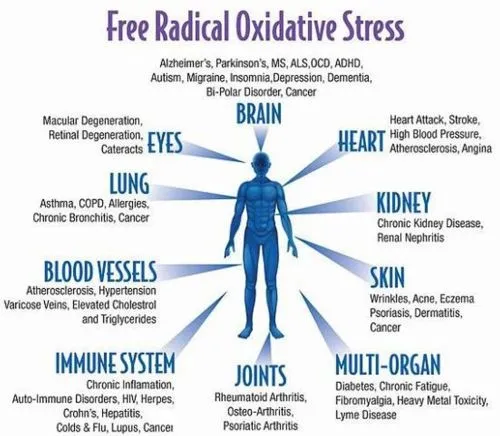
Anti-Inflammatory Effects
Anti-Inflammatory Effects: Hydrogen inhalation has shown
promise in reducing inflammation, which is beneficial
for conditions such as rheumatoid arthritis, cardiovascular
diseases, and neurodegenerative disorders.
| Hydrogen (H2) has been utilized in diving medicine
for many years, and it is proved that hydrogen, unlike
other medical gases such as nitric oxide, carbon
monoxide, or hydrogen sulfide, is non-toxic for human
body even at high pressure or concentration.1,2 However,
hydrogen’s therapeutic effects against diseases
were unknown or ignored in the past. Until 1975,
hydrogen’s inhibitory effect against squamous
cell carcinoma of mouse skin was reported by Dole
et al.3 Roberts et al.4 also disclosed hydrogen’s
prohibition against the growth of mouse tumor cells
and leukemia cells in 1978. Especially, in 2007 Ohsawa
et al.5 discovered that hydrogen is capable of selectively
detoxifying hydroxyl radicals (• OH) and peroxynitrite
(ONOO–) among active oxygens (such selectively
detoxifying ability was further discussed by Liu
et al.6 in 2010). Thereafter, the study and research
of hydrogen biomedicine has been rapidly grown, including
not limited to alleviation of inflammation,7,8,9 alleviation of cell apoptosis,10,11 alleviation of
side effects caused by anti-cancer therapy,12,13 and cancer inhibition.14 |
Hydrogen inhalation has been shown to significantly
reduce inflammation. By modulating inflammatory pathways
and reducing the levels of pro-inflammatory cytokines,
hydrogen gas can help manage conditions characterized
by chronic inflammation, such as rheumatoid arthritis,
inflammatory bowel disease, and even metabolic disorders?
(NCBI)?
Study: "Molecular hydrogen inhibits lipopolysaccharide/interferon
?-induced nitric oxide production through modulation of signal
transduction in macrophages" (Biochemical and Biophysical
Research Communications, 2011).More
Neuroprotection
One of the most promising areas of hydrogen therapy
is its potential neuroprotective effects. Studies have
indicated that hydrogen inhalation can protect brain
cells from oxidative damage and apoptosis (cell death),
making it a potential treatment for neurodegenerative
diseases such as Parkinson’s disease, Alzheimer’s
disease, and stroke?
Study: "Hydrogen gas improves
functional recovery in a rat model of acute spinal cord
injury" (Neuroscience Letters, 2014).
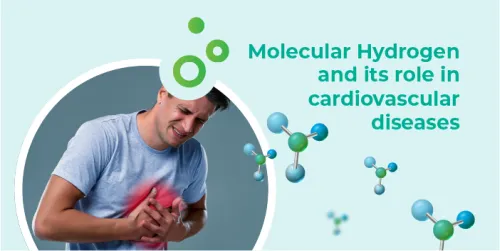
Cardiovascular Health
Hydrogen
gas may benefit cardiovascular health by reducing oxidative
stress and inflammation in blood vessels. This
can help prevent and treat conditions like hypertension,
atherosclerosis, and myocardial ischemia-reperfusion
injury. The antioxidative properties of hydrogen can
improve vascular function and reduce the risk of heart
disease?
(Study: "Hydrogen-rich water reduces inflammatory
responses and prevents apoptosis of peripheral blood
cells in healthy adults during aerobic exercise" (Medical
Gas Research, 2011).
Hydrogen Inhalation and Heart Disease click here
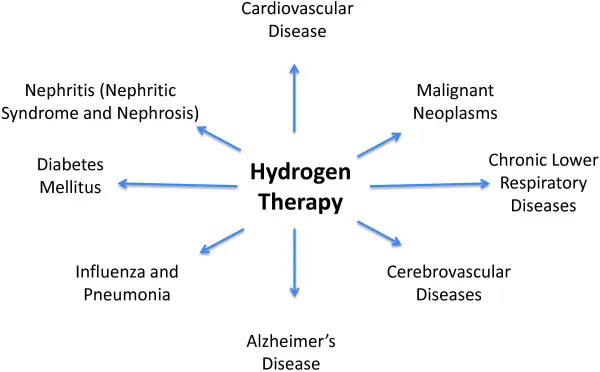
Improved Metabolic Health
Research suggests that hydrogen inhalation may improve
metabolic health by reducing oxidative stress in metabolic
tissues such as the liver and adipose tissue. This can
enhance insulin sensitivity and glucose metabolism, offering
potential benefits for individuals with diabetes or metabolic
syndrome? .
Efficacy and Safety of Hydrogen Therapy in Patients
with Early-Stage Interstitial Lung Disease: A Single-Center,
Randomized, Parallel-Group Controlled Trial
Alzheimer’s Disease
This study suggests that H2 inhalation resulted in marked
improvements as assessed by ADAS-cog and DTI, and importantly,
provided not only temporary relief, but also maintained
the effect for at least 6 months without H2 treatment.
However, this study of H2 inhalation in AD patients had
a small number of patients, and was an open label clinical
study. Further studies require a randomized, placebo-controlled
group to clarify the effect on a large number of patients.
Despite these limitations, we propose that H2 inhalation
is a candidate for the disease-modifying treatment of
AD, as the effects of H2 inhalation is striking. Source
Enhanced Recovery and Athletic Performance
Athletes
may benefit from hydrogen inhalation due to its ability
to reduce oxidative stress and inflammation
caused by intense physical activity. This can lead to
faster recovery times, reduced muscle fatigue, and improved
overall performance. Hydrogen therapy has been explored
for its potential to enhance endurance and reduce the
impact of exercise-induced oxidative damage?
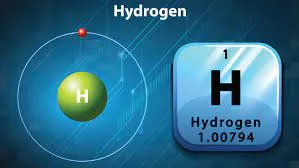
Tumors
""Multiple research has shown in Tumor Treatment
that hydrogen can target tumor cells directly and stop
them from growing and spreading significantly. It has
been shown that hydrogen can inhibit several proteins
and genes responsible for tumor growth.." Source
Hydrogen
Inhalation in Cancer Treatment
"In conclusion, the findings of this systematic
review have shown that there is sufficient evidence of
H2’s therapeutic effects on cancer. The therapy
can be applied through various administration methods
while generally demonstrating similar outcomes with no
major adverse effects.", Source

Diabetes
"In recent years, numerous scientific reports have
been published about the remarkable effect of molecular
hydrogen inhalation in patients with Type 2 Diabetes
Mellitus. The results achieved in a number of studies
indicate that the inhalation of hydrogen (H2) represents
a new effective strategy for treating diabetes and improving
the condition of those suffering from the disease." More
Hydrogen Diabetes information here
Therapeutic potential of molecular hydrogen in ovarian
cancer
Enhanced Recovery and
Athletic Performance
Athletes may benefit from hydrogen inhalation due to
its ability to reduce oxidative stress and inflammation
caused by intense physical activity. This can lead to
faster recovery times, reduced muscle fatigue, and improved
overall performance. Hydrogen therapy has been explored
for its potential to enhance endurance and reduce the
impact of exercise-induced oxidative damage?
Taken together, the inhalation of H2 gas for 6
months improved Alzheimer’s disease (AD),
as assessed by clinical ADAS-cog and objective
DTI. Moreover, at least after 6 months
without H2 treatment, the improvement was maintained,
suggesting that this treatment provides not only
temporary relief, but also a disease-modifying
effect. Therapeutic
Inhalation of Hydrogen Gas for Alzheimer’s
Disease Patients
Safety and Accessibility
Hydrogen inhalation therapy is generally considered
safe and well-tolerated, with no significant adverse
effects reported in studies. It is a non-invasive treatment
that can be easily administered using a hydrogen generator
and inhalation device, making it accessible for both
clinical and at-home use? (NCBI).
Conclusion
Hydrogen inhalation therapy offers a range of potential
health benefits, from antioxidant and anti-inflammatory
effects to neuroprotection and improved metabolic health.
As research continues to explore its therapeutic potential,
hydrogen gas may become a valuable tool in the management
of various health conditions and the promotion of overall
well-being.
For more detailed information on the scientific studies
and clinical applications of hydrogen inhalation therapy,
visit
Benefits of Breathing Hydrogen and Oxygen Together
Breathing a mixture of hydrogen (H2) and oxygen (O2)
has gained attention for its potential therapeutic
benefits. The combination of these gases may offer enhanced
health
effects, leveraging the antioxidant properties of hydrogen
and the essential role of oxygen in cellular metabolism.
Enhanced Cognitive Function:
Improved oxygenation through breathing oxygen-enriched
air can enhance cognitive functions such as memory, attention,
and mental clarity. Combined with hydrogen's protective
effects, this therapy may offer comprehensive support
for brain health?

Respiratory Health
Improved Oxygen Utilization:
Breathing a mixture of hydrogen and oxygen can enhance the efficiency of oxygen
utilization in the body, especially in conditions where oxygen delivery is
compromised, such as chronic obstructive pulmonary disease (COPD) and asthma?
Hydrogen's anti-inflammatory properties can help reduce airway inflammation,
making breathing easier and more effective. More information
| In a randomized controlled trial, people experiencing
persistent symptoms following
a COVID-19 infection reported improved physical function (6-minute walking
test) and lung function (forced vital capacity and
forced expiratory volume) with inhaled hydrogen gas
compared to a placebo. Hydrogen gas (100% hydrogen)
was inhaled for 1 hour twice a day for 14 days.[2]
In an open-label, multicenter trial in hospitalized
patients with COVID-19, inhaled hydrogen gas (66.7%
hydrogen and 33.3% oxygen) led to reduced disease
severity, reduced chest pain, and a faster improvement
in shortness of breath and cough compared to participants
receiving oxygen gas alone.. Source |
Cardiovascular
Benefits
Improved Heart Health:
The combination of hydrogen and oxygen can benefit cardiovascular health by
reducing oxidative stress and inflammation in the cardiovascular system.
This can help prevent conditions like hypertension, atherosclerosis, and
myocardial ischemia-reperfusion injury? .
Enhanced oxygen delivery ensures that heart tissues receive sufficient oxygen,
which is crucial for optimal function and recovery. More
Enhanced Blood Flow:
Hydrogen has been shown to improve endothelial function and promote vasodilation,
enhancing blood flow and reducing the risk of cardiovascular diseases. Combined
with oxygen, this effect can be maximized, improving overall circulation More
Conclusion
The combined use of hydrogen and oxygen for inhalation therapy
offers a range of potential health benefits, from enhanced
antioxidant and anti-inflammatory effects to improved cardiovascular
and respiratory health. As research continues to explore
its therapeutic potential, hydrogen-oxygen therapy may become
a valuable tool in promoting overall well-being and managing
various health conditions.
For more detailed information and scientific studies on
hydrogen-oxygen therapy, visit NCBI and other reputable medical
research sources.
Healing Water of Life
How Hydrogen works in the body
The
Healing Power Of Hydrogen Water
More Information
Hydrogen Inhalation,
Oxygen, Breather
and Hydrogen Water Pro 2..





Hydrogen, Oxygen,
Inhalation
and Hydrogen Water unit Pro 2
|

Click on Picture for Short Video |
Heavy Duty Portable Molecular Hydrogen Inhalator 1000ml Plus
H2 O2 Inhalation plus Hydrogen Water maker
 1000ml
Pem SPE Hydrogen Inhalation 1000ml
Pem SPE Hydrogen Inhalation
 Voltage
to Suit your Country Voltage
to Suit your Country
 Prioduces
Oxygen for Breathing Prioduces
Oxygen for Breathing
 Make
Hydrogen Water Make
Hydrogen Water
 Easy
to use Short Video Easy
to use Short Video
 Full
instructions Full
instructions
 Water
not Included :) Water
not Included :)
|
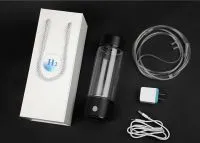 |
Hydrogen INHALATION
plus Hydrogen Water
 Japanese
type membrane used Japanese
type membrane used
See pictures above
|
| |
|
|
Hydrogen Water Flask
Provide strong antioxidant hydrogen-rich water.
Portable - Use it anywhere, anytime to produce fresh
hydrogen-water!
 Powerful "Membrane" H
Generator Powerful "Membrane" H
Generator
 Voltage:
DC 5V/1A Rechargable Voltage:
DC 5V/1A Rechargable
 Power:
=5w Adapter included for your countries voltage Power:
=5w Adapter included for your countries voltage
|
| |
|
|
Bench Top Family Hydrogen
water system
Specification:
 Rated
Voltage: 100-240v 50/60 HZ 1.8A Rated
Voltage: 100-240v 50/60 HZ 1.8A
 Capacity:
1- 2.5L Capacity:
1- 2.5L
 Timer
8 and 10 mintues Timer
8 and 10 mintues
 Hydrogen
water producing: Basic/Strength way Hydrogen
water producing: Basic/Strength way
 Dissolved
Hydrogen: 0.8ppm to 1.8ppm Dissolved
Hydrogen: 0.8ppm to 1.8ppm
 PH
balance: 7.6 (slightly more alkaline, stabilizing
the dissolved hydrogen) PH
balance: 7.6 (slightly more alkaline, stabilizing
the dissolved hydrogen)
 ORP:
-500 to -550 (reducing/antioxidant) ORP:
-500 to -550 (reducing/antioxidant)
 RH2
(Relative Hydrogen): 1 to 5 (reducing/antioxidant) RH2
(Relative Hydrogen): 1 to 5 (reducing/antioxidant)
|
| |
|
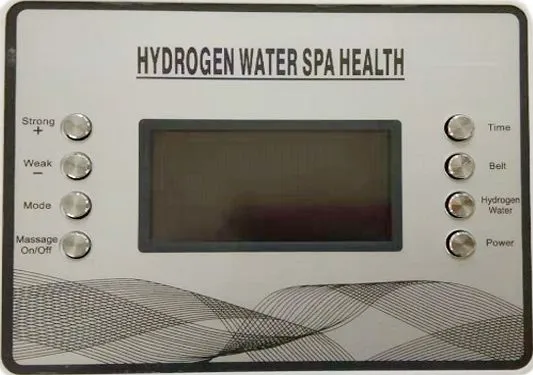 |

Hydrogen
Detox foot Spa
The main effect of Negative hydrogen
spa
Detox your body through soaking your feet in Hydrogen water:
Negative hydrogen ions has natural antioxidant biological properties,
to free the body of toxins, free radicals and other waste into harmless
water,
 1x
Hydrogen Detox spa 1x
Hydrogen Detox spa
 1x
bamboo charcoal far infrared waistbands Slimming
Belt 1x
bamboo charcoal far infrared waistbands Slimming
Belt
 1x
Detox Array 1x
Detox Array
 1x
Wrist Bands 1x
Wrist Bands
 Power
supply 110-240v Power
supply 110-240v
More
Information
|
References
Ohta, S. (2014). Molecular hydrogen as a preventive and
therapeutic medical gas: initiation, development and potential
of hydrogen medicine. Pharmacology & Therapeutics, 144(1),
1-11.
Ichihara, M., Sobue, S., Ito, M., et al. (2015). Beneficial
biological effects and the underlying mechanisms of molecular
hydrogen - comprehensive review
of 321 original articles. Medical Gas Research, 5(1), 12.
Itoh, T., Hamada, N., Terazawa, R., et al. (2011). Molecular
hydrogen inhibits lipopolysaccharide/interferon ?-induced
nitric oxide production through modulation
of signal transduction in macrophages. Biochemical and Biophysical Research
Communications, 411(1), 143-149.
Johnsen HM, Hiorth M, Klaveness JMolecular Hydrogen Therapy-A
Review on Clinical Studies and Outcomes.Molecules.(2023 Nov
26)
^Botek M, Krejcí J, Valenta M, McKune A, Sládecková B,
Konecný P, Klimešová I, Pastucha DMolecular
Hydrogen Positively Affects Physical and Respiratory Function
in Acute Post-COVID-19 Patients: A New Perspective in Rehabilitation.Int
J Environ Res Public Health.(2022 Feb 10)
^Guan WJ, Wei CH, Chen AL, Sun XC, Guo GY, Zou X, Shi JD,
Lai PZ, Zheng ZG, Zhong NSHydrogen/oxygen mixed gas inhalation
improves disease severity and dyspnea in patients with
Coronavirus disease 2019 in a recent multicenter, open-label
clinical
trial.J Thorac Dis.(2020 Jun)
^Zheng ZG, Sun WZ, Hu JY, Jie ZJ, Xu JF, Cao J, Song YL,
Wang CH, Wang J, Zhao H, Guo ZL, Zhong NSHydrogen/oxygen
therapy for the treatment of an acute exacerbation of chronic
obstructive pulmonary disease: results of a multicenter,
randomized, double-blind, parallel-group controlled trial.Respir
Res.(2021 May 13)
^Wang ST, Bao C, He Y, Tian X, Yang Y, Zhang T, Xu KFHydrogen
gas (XEN) inhalation ameliorates airway inflammation
in asthma and COPD patients.QJM.(2020 Dec 1) |

